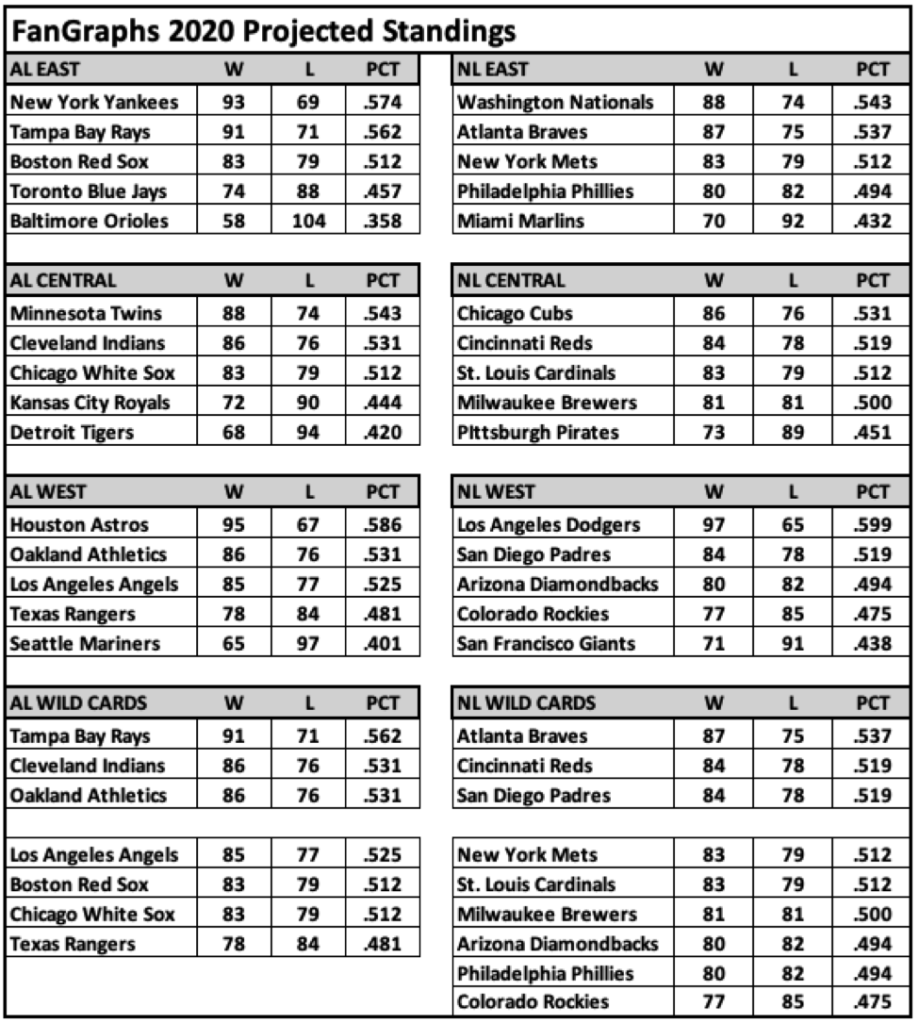What Would Really Happen In A Shortened Season?

It’s safe to say no one really knows how many games will be played by Major League Baseball this season. April and May have essentially been ruled out (well, kind of) , and June looks sketchy to me. If baseball is somehow able to start in June, we could potentially have four months of regular season baseball at the most, unless MLB pushes the regular season into October and beyond. Personally, I wouldn’t bet on any games in June and I don’t think MLB wants to play many postseason games in November.
A recent series of tweets from Matt Spiegel suggested MLB is discussing a 100-game season that would begin on July 1 and bypass the All-Star game this year but use Dodger Stadium as a warm-weather location for the World Series. If the Dodgers make the World Series, it would be played in Anaheim or San Diego.
Of course, all of this is just unverified rumor right now and July 1 is likely an optimistic outlook at this point. Ken Rosenthal reported that the Premier League (soccer) and the NBA are considering quarantining teams and playing in a centralized location without fans and that MLB “is entertaining a similar idea and numerous other options as it ponders ways to conduct the 2020 season.” Despite the desire to get the season started, there are major complications with any proposal to get professional sports going again.
With all that in mind, it would seem that the most regular season games a fan can hope for is 100, but a more-likely scenario would be 80 games or possibly even a two-month regular season that would consist of 60 games.
Given these unusual circumstances, I wondered how the standings would have been different had MLB used a 60-game or 80-game or 100-game schedule over the last eight seasons. This analysis will go back to 2012, the first year of the two wild card era. Some assumptions have been made. Essentially, I stop the season on the Sunday closest to the games played total I’m considering. We don’t really know how a team would behave if they knew ahead of time that the season would only last 60, 80, or 100 games, so that hypothetical isn’t being considered.
Considering the big picture, over the last eight years there have been 80 playoff spots. Looking at the standings for these seasons around the 60-game mark, we find that 67.5 percent of the teams that had a playoff spot at that time went on to make the playoffs in the actual 162-game season.
The percentage increases very slightly for seasons around 80 games long. In this scenario, 70 percent of teams that had a playoff spot at the 80-game mark went on to make the playoffs. Essentially, using the small samples size of the last eight seasons, if you look at the standings at the 60-game or 80-game mark, about seven of the 10 would-be playoff teams went on to make the playoffs. You could say an 80 or 60-game season resulted in an average of three surprise teams per year making the postseason.
In the optimistic scenario for 2020, a 100-game season, recent history reveals that 78.8 percent of the teams that had a playoff spot at the 100-game mark went on to make the playoffs. Even a 100-game season allowed for an average of two surprise teams per year to make the playoffs.
2012-2019 Summary
- 60-game mark: 67.5 percent of teams in playoff spots made the playoffs (54 teams)
- 80-game mark: 70 percent of teams in playoff spots made the playoffs (56 teams)
- 100-game mark: 78.8 percent of teams in playoff spots made the playoffs (63 teams)
When looking at these seasons, there were times when a team that was leading its division at one of these designated points ended up making the playoffs as a wild card team. With that in mind, I looked at how often a division-leading team went on to win their division in these shorter seasons. With three divisions in each league and eight seasons total, this gives us 48 playoff spots. Here are the results:
2012-2019 Summary for Division Leaders
- 60-game mark: 50 percent of division leaders won their division (24 teams)
- 80-game mark: 58.3 percent of division leaders won their division (28 teams)
- 100-game mark: 64.6 percent of division leaders won their division (31 teams)
A chart of the different outcomes based on potential season lengths:

Some Hypothetical Highlights of Shortened Seasons from 2012 to 2019
Good (fake) news, Mariner fans! Had the 2014 season been limited to 100 games, the Seattle Mariners would have ended their playoff drought at 12 seasons rather than their ongoing 18-season streak. At the 100-game mark that year, the Mariners were 1.5 games up on the Yankees for the second wild card. They continued to fight for the playoffs in the second half, but a 5-game losing streak in late-September damaged their hopes. They rebounded to win their final four games, but still finished a game behind the A’s for that second wild card spot.
The Mariners also would have made the playoffs as the second wild card team if the 2018 season was limited to 100 games. Two playoff spots in five seasons would have been one of the best stretches in team history!
Not far behind the Mariners on the longest playoff drought list are the Miami Marlins. They last made the postseason in their World Series-winning year of 2003. They followed that up with four winning seasons in the next six years, then began a streak of losing seasons in 2010 that is still ongoing. It would be different if the 2016 season only lasted roughly 100 games (July 24). At that point of the year, the Marlins were 53-45 and a half-game ahead of the Mets for the second wild card. Unfortunately, they went 26-37 down the stretch and finished 7.5 games out of a playoff spot. Tragically, this was also the season Jose Fernandez died in a boating accident in September.
Another team with a long playoff drought is the Chicago White Sox. They last made the postseason in 2008. Had the 2012 season ended at 100 games, the White Sox would have won the AL Central, cutting their current playoff drought from 11 seasons to seven.
The Kansas City Royals surprised many when they went to back-to-back World Series in 2014-2015. After winning the 2015 series, they kept the core together for two more years, but couldn’t get back to the postseason. Eric Hosmer and Lorenzo Cain left as free agents after the 2017 season. If that 2017 season had lasted only 100 games, the Royals would have snagged the second wild card and been able to make one more post-season run with the Hosmer/Cain/Moustakas/Perez group. Who knows how that might have turned out?
The Dodgers are currently enjoying a seven-season streak of winning the NL West. If the MLB season had been 100 games long since 2012, they would have won the NL West four times in those seven years, with an active streak of just three seasons. The Giants led the NL West at the 100-game mark back in 2016 and 2014. The Diamondbacks were the top team in the NL West at the 100-game mark in 2013.
The Detroit Tigers had a nice run of playoff seasons from 2011-2014, making the ALCS three times and the World Series once. Unfortunately for Tiger fans, they lost two of the three ALCS matchups and the 2012 World Series. That series was the last, close chance for longtime Tigers owner Mike Ilitch to win a championship. In this alternate reality, had the 2016 season ended around the 80-game mark, the Tigers would have had one more chance at postseason play with the Miguel Cabrera/Victor Martinez/Justin Verlander group before Ilitch’s death the following February.
One of the great disappointments in baseball is that the game’s best player, Mike Trout, has only appeared in one postseason series. That was in 2014 against the Royals and Trout went 1-for-12 as the Angels were swept. If the last eight seasons were limited to 100 games, Trout’s Angels would have made the playoffs twice more in his career.
In 2015, the Angels were leading the AL West at roughly the 100-game mark (July 26), but faltered down the stretch and ultimately finished third in a tight AL West race while failing to make the playoffs. In 2012, Trout’s first full season, the Angels were in the second wild card spot at roughly the 100-game mark (July 29), but couldn’t hold that spot over the last couple months of the season. They ultimately finished four games out of a wild card spot.
What about 2020?
We don’t know what the future will bring for MLB, but we know that it won’t be the traditional 162-game season. If history is our guide, it’s very likely that some surprise teams will make the playoffs should there be a season. The 2020 projected standings from FanGraphs gives us an idea of the teams to watch this year.

The biggest surprise team from the AL teams not projected to win their division or snag a wild card spot would be the Texas Rangers. They sit comfortably behind a pack of AL teams projected to be on the cusp of a wild card spot. A few fortunate bounces, development of young players, some good luck in close games, and the Rangers could slip into the postseason. It wasn’t that long ago (2016) that they went 95-67 despite a mediocre +8 run-differential (their Pythagorean W-L record was 82-80). Maybe the ball bounces their way in a shortened 2020 season.
Other AL possibilities that would be fun to watch would be the Angels, so Mike Trout and Shohei Ohtani can play on the big stage, and the White Sox, who haven’t made the postseason since 2008.
The NL wild card race projects to be even messier than the AL. FanGraphs projects seven teams to finish within four wins of the second wild card spot over the course of a full season. A shortened season might even tighten that up. With that in mind, it wouldn’t be all that surprising to see any of these teams snag a place in the postseason. The Rockies, on the other hand, would be a surprise based on their 71-win 2019 season and their 77-win projection. Perhaps a shorter season will lead to an ultimate surprise World Series matchup of the Texas Rangers and Colorado Rockies. As strange as that sounds, it wouldn’t be the strangest thing to happen this year.
















